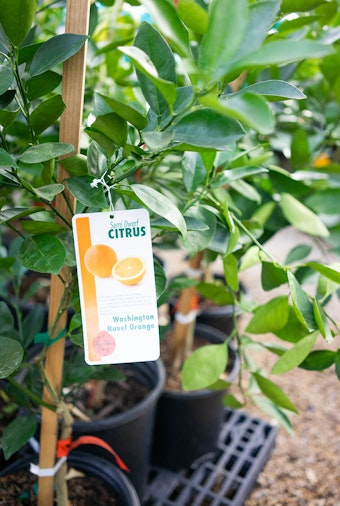Semi-Dwarf Citrus Trees

Specialty Semi-Dwarf Citrus Trees
At SummerWinds Nursery, we carry a seasonal variety of specialty semi-dwarf citrus trees—perfect for growing in small spaces or as a container specimen.
Do you enjoy the taste of fresh citrus—whether eaten raw, added as an ingredient to a homemade recipe, or squeezed into your favorite beverage? Check out these semi-dwarf citrus varieties you can grow on your patio or deck, or in your garden landscape.
Semi-Dwarf Citrus Varieties
Available While Supplies Last:
- Calamondin: Calamansi
- Grapefruit: Cocktail, and Rio Red
- Kumquat: Centennial Variegated, Fukushu, and Meiwa
- Lemon: Buddha's Hand, Eureka, Genoa (Italian), Improved Meyer, Lisbon, New Zealand, Santa Teresa, and Vareigated Pink
- Lime: Australian Finger, Bearss Seedless, Thai, and Thornless Mexican
- Mandarin: California Honey, Clementine, Clementine De Nules, Clementine Nour, Dancy, Gold Nugget, Lee x Nova, Owari Satsuma, Royal, and Tango
- Orange: Chinotto Sour, Lane Late Navel, Midknight Valencia, Minneola, Robertson Navel, Sanguinelli Blood, Smith Red, Trovita, Valencia, and Washington Navel
- Pummelo: Chandler, and Tahitian
- Tangelo: Minneola
Selection and sizes vary by location and are available seasonally, while supplies last. Contact your local SummerWinds Nursery with questions about current availability, specific varieties or sizes.
Some Semi-Dwarf Citrus Favorites
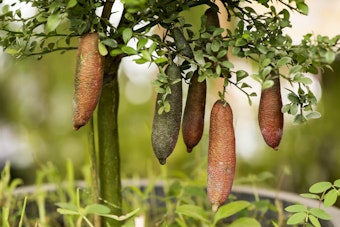
Australian Finger Lime
The Australian Finger Lime (Citrus australasica) is an exotic citrus plant with caviar-like fruit, ideal for adding a gourmet touch to dishes. The small, thorny tree is well-suited to hot desert climates like Phoenix. Finger limes thrive in semi-shaded spots and offer unique, tangy citrus pearls that burst with flavor, perfect for garnishing seafood, cocktails, and salads.
- Climate: Hot, dry tolerance; partial sun
- Size: 6-8 feet
- Water: Moderate; water deeply every 1-2 weeks, especially in dry periods
- Frost Tolerance: Moderate; provide protection when frost is expected (below 32°F)
- Fruit: Caviar-like, tangy pearls
- Pests/Diseases: Minimal with basic care
- Pollination: Self-fertile
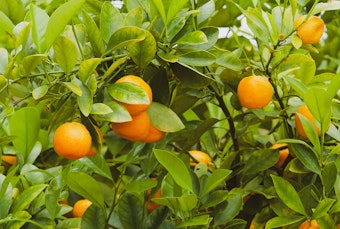
Calamansi Calamondin
The Calamansi Calamondin (Citrus microcarpa) is a compact, ornamental citrus tree known for its small, tangy fruits. Popular in Southeast Asian cuisine, this hybrid of kumquat and mandarin thrives in hot climates like Phoenix, AZ. The fruit, with its tart flavor, is perfect for beverages, marinades, and preserves. The tree also offers fragrant blossoms, making it both a culinary and decorative addition to home gardens.
- Climate: Warm, dry tolerance; full to partial sun
- Size: 6-10 feet
- Water: Moderate, but increase frequency in extreme heat (deep water weekly)
- Frost Tolerance: Low; protect when temperatures fall below 30°F
- Fruit: Small, tart, aromatic
- Pests/Diseases: Minimal; some aphid susceptibility
- Pollination: Self-fertile
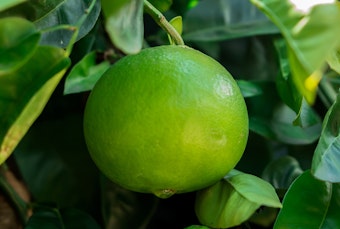
Chandler Pummelo Grapefruit
The Chandler Pummelo (Citrus maxima) is a vigorous, evergreen citrus tree that produces large, round to slightly pear-shaped fruits with thick, pale-yellow to greenish rinds. Its flesh is pink to reddish, juicy, and sweet with mild, refreshing flavor. Unlike grapefruits, the Chandler Pummelo lacks the strong bitterness, making it a favorite for fresh eating. This tree thrives in warm climates and is highly ornamental, featuring lush, glossy green foliage and fragrant white blossoms.
- Climate: Warm, sunny locations; full sun
- Size: 8-12 feet
- Water: Moderate, deep watering every 1-2 weeks in summer
- Frost Tolerance: Moderate, but protect below 28°F
- Fruit: Large, round to slightly pear-shaped; pink to reddish flesh, sweet and mild flavor
- Pests/Diseases: Generally minimal; may need pest monitoring
- Pollination: Self-fertile
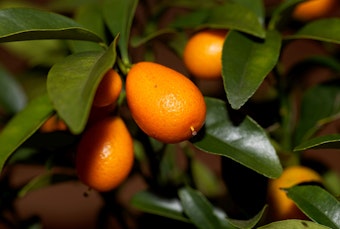
Fukushu Kumquat
The Fukushu Kumquat (Citrus japonica) is a compact, evergreen tree that produces small, round to slightly bell-shaped fruits with a sweet, edible peel and mildly tart, juicy flesh. Known for its balanced flavor, it is excellent for fresh eating, preserves, or garnishes. The Fukushu variety has fewer seeds than other kumquats and a thinner, smoother peel, making it a favorite among citrus enthusiasts. Well-suited for container growth, this tree thrives in warm, sunny environments and adds ornamental value with its glossy leaves and fragrant blooms.
- Climate: Warm and sunny; full sun
- Size: 6-8 feet
- Water: Moderate, increase frequency during high summer heat
- Frost Tolerance: Low to moderate; protect below 30°F
- Fruit: Small, round to bell-shaped; sweet peel, midly tart flesh, few seeds
- Pests/Diseases: Generally minimal; may attract scale insects
- Pollination: Self-fertile
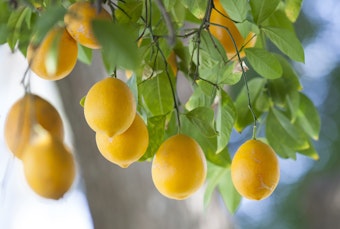
Improved Meyer Lemon
The Improved Meyer Lemon (Citrus × meyeri) is a versatile and popular citrus tree, prized for its sweeter, thin-skinned lemons. Ideal for warm climates, this compact tree produces a high yield of fruits, perfect for juicing, desserts, and cooking. Its ornamental value, with fragrant flowers and bright fruit, makes it a must-have for home gardeners.
- Climate: Warm, dry tolerance; full sun
- Size: 6-10 feet
- Water: Moderate; water weekly during hot weather
- Frost Tolerance: Moderate, but sensitive to frost below 28°F
- Fruit: Sweet, juicy, thin-skinned lemons
- Pests/Diseases: Some susceptibility to aphids and mites
- Pollination: Self-fertile
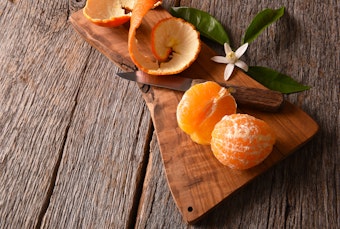
Minneola Tangelo
The Minneola Tangelo (Citrus × tangelo) is a hybrid of tangerine and grapefruit, offering juicy, easy-to-peel fruits with a delightful balance of sweetness and tang. This small to medium-sized tree thrives in warm, sunny climates and is a popular choice for citrus lovers. Its bell-shaped fruit and rich flavor make it perfect for fresh eating or juicing.
- Climate: Warm, dry tolerance; full sun
- Size: 8-12 feet
- Water: Moderate; deep water every 1-2 weeks during extreme heat
- Frost Tolerance: Low to moderate; protect from frost when temperatures dip below 28°F
- Fruit: Sweet-tart, juicy, bell-shaped
- Pests/Diseases: Minimal; basic care required
- Pollination: Self-fertile but benefits from cross-pollination for better yield
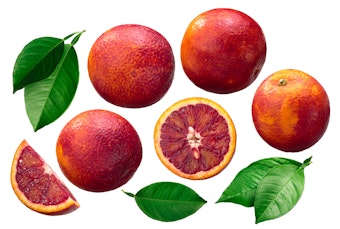
Sanguinelli Blood Orange
The Sanguinelli Blood Orange (Citrus x sinensis) is a late-season blood orange variety known for its rich, sweet flavor with hints of raspberry and spice. Its rind develops a deep red blush, and the flesh is beautifully streaked with burgundy. This tree thrives in hot, sunny climates and adds an ornamental touch with its fragrant white blossoms and striking fruit. Sanguinelli blood oranges are excellent for fresh eating, juicing, and culinary uses, bringing vibrant color and flavor to dishes.
- Climate: Warm, sunny locations; full sun
- Size: 8-12 feet
- Water: Moderate, with deep watering weekly in summer
- Frost Tolerance: Moderate; protect below 30°F
- Fruit: Sweet with raspberry and spice notes; red-bluish rind, burgundy-streaked flesh
- Pests/Diseases: Generally minimal; may need aphid management
- Pollination: Self-fertile
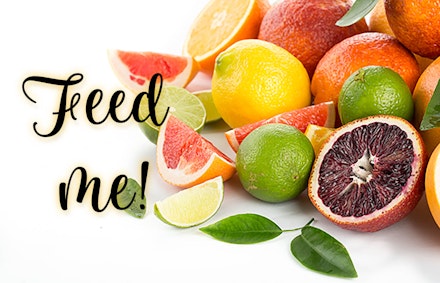
Fertilize Your Citrus Trees & Shrubs
We recommend fertilizing your citrus three times a year—in September, February and May.
Click the buttons below to learn more about citrus:
Citrus Feeding Time Citrus Tree Care Citrus Tree VarietiesPlanting a Tree?
Watch our video to learn how to do it like the pros!
This video will show you the basics to planting trees, shrubs and more. We will focus on trees but the same can apply to shrubs, perennials and more. With these simple steps, you can successfully plant your next garden.

